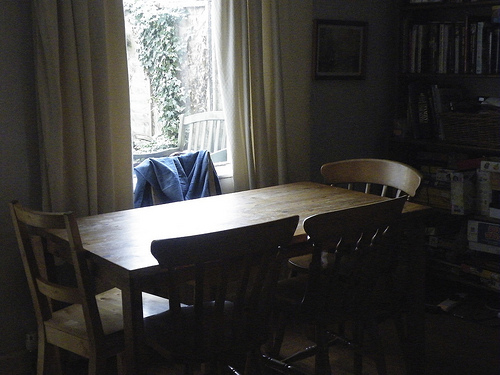When I was ‘researching’ the parenting booklet, one of the topics that came up again and again in the responses was the importance of families sitting down to eat together regularly.
Since then I found this article by Richard Corrigan, a London chef, who explains why he is supporting a research project that is looking into the effects of mealtimes on family life and social cohesion.
I have always instinctively felt the truth behind the cliché that the family which eats together stays together. But is that hunch backed up by hard facts or is it a nostalgic dream, increasingly unobtainable in a world where many parents work long and unpredictable hours?
Well, the usefulness of family meals is no fantasy. You would expect me, as a life-long restaurateur, to argue in favour of the positive effects of people breaking bread together. I watch people do it everyday. It is one of the reasons I love my work.
But I am equally passionate about the importance of meals in the home. My wife, Maria, and our three children – Richard, Jessica and Robert – try to sit down and eat together as often as we can. This has always felt like common sense. It worked for me as a boy growing up north of Dublin and, although there is less greenery around us at our home in north London, it works for me as a father.
It is one of the reasons I agreed to become the patron of a British think tank which tries to put some hard science behind the soft glow of a good home. The Home Renaissance Foundation was founded by my friend Sir Bryan Sanderson, a former managing director of BP and chairman of BUPA. He wanted to promote an understanding and an appreciation of what our homes can do when they work well. Research by the Home Renaissance Foundation shows us that family meals should not be dismissed as so much 1950s retro.
According to economics professor Dr Sophia Aguirre, who wrote a paper for the Foundation about this, family dinners generate “human capital”. Kids who sit down regularly with parents and siblings do better at exams than those who don’t. Rates of substance abuse, obesity and eating disorders are also lower. Her graphs show that what really matters is the quality of the time together. As soon as a television is switched on during a family meal, a lot of the good socialising stops.
Now, you could argue that, if kids have parents who are up to organising a family meal at the dining table, those children already have a headstart.
For one thing, many of the homes we build nowadays have no room for a dining table. And if it’s not the building, it’s the people. In chaotic families, the routine that regular meal times need just isn’t there.
But Dr Aguirre’s work also shows how it is precisely these disadvantaged youngsters who need formal family meals more than others. It is at the dining table that we impart some of the most important lessons of life: how to tell a story, share our recollections of the day and listen politely. It is where kids should learn something about manners. Not formal etiquette, but how to behave in company. It is easy to dismiss these things as irrelevant.
Here is the introduction to the ‘Meals and Food’ chapter of the parenting booklet:
Eating together, each day, without the TV or computer on, can bring so many blessings to family life. It gives your children time with you, and time with each other. It allows you to listen, to talk, and to share things. It gives rhythm and regularity to each day, and to the week – which is so important for the children. It puts the brakes on the constant rushing of modern life.
Eating together gives space for personalities to grow, for language to develop, for ideas to emerge. It gives a simple way of praying together, if you say grace before meals, and pray in thanksgiving after them. And you make sure that the children are eating well!
This is hard for many people. There are activities after school. Perhaps you have shift-work. The children want to go out or do homework or watch TV. Or the simple fact is that you are not in the habit of eating like this, and it seems like a big hassle to force everyone to sit together. But the long-term benefits are absolutely huge. Regular meals together – or as regular as is possible for you – are one of the keys to good family life.
And here is one of the quotes about how meals depend on tables!
Just having a table is important! Some of the families in our parish didn’t have a kitchen or dining table to sit round for meals at home. We spoke about this in the Holy Communion classes, and helped one or two to get a table. It doesn’t have to be expensive. They came back and said what a difference it made – talking, listening, and sometimes arguing, and then making up; just being together in a way that doesn’t happen if you don’t make time.

